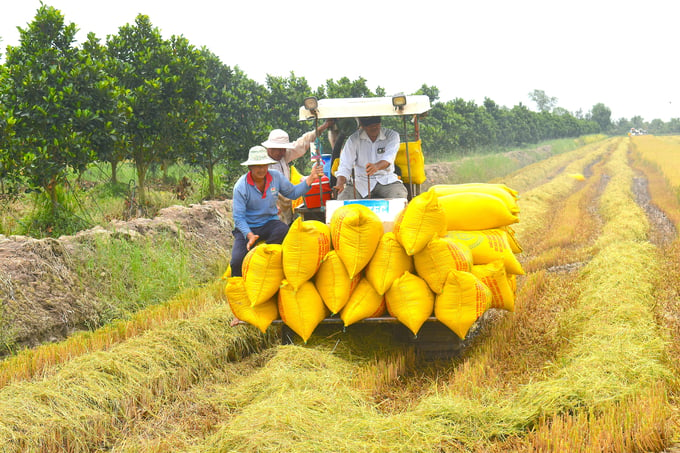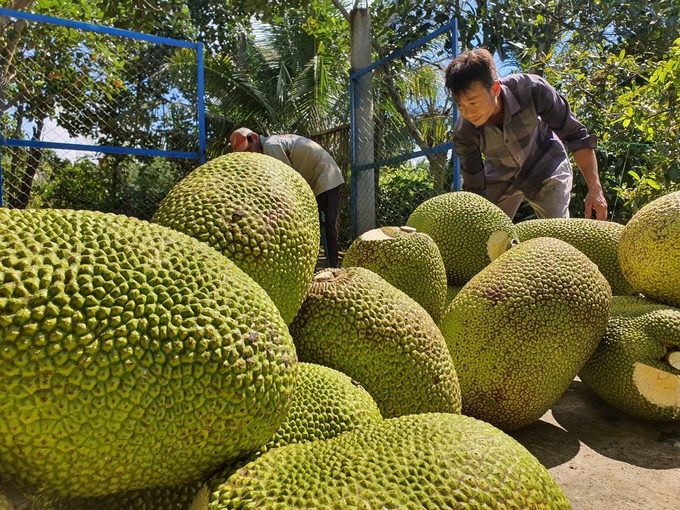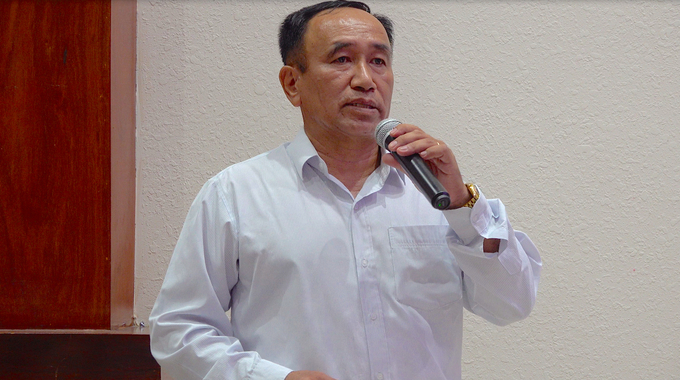May 21, 2025 | 04:47 GMT +7
May 21, 2025 | 04:47 GMT +7
Hotline: 0913.378.918
May 21, 2025 | 04:47 GMT +7
Hotline: 0913.378.918
Mr. Nguyen Van Khang, Chairman of the Union of Scientific and Technical Associations of Tien Giang Province, stated that Tien Giang Province has issued numerous resolutions, plans, and action programs to focus on developing cooperative economic components. Specifically, these include Program 30 of the Provincial Party Committee, Decision No. 2848, and Action Plan No. 102 of the Provincial People's Committee. As a result, many new-style agricultural cooperatives (ACs) have been operating effectively, such as Mỹ Tịnh An AC, Go Cong Aquaculture AC, Phu Quoi AC, Dong Nghi AC, Hung Thinh Phat AC, My Loi A AC.
The business activities of these ACs have contributed to poverty reduction, job creation, and an improvement in the material life of their members. Simultaneously, they have played a role in building new rural areas and restructuring agriculture. However, in the process of development, agricultural cooperatives in Tien Giang still face limitations, such as small scale, unsustainable production linkages, non-competitive products, and relatively low operational efficiency.

Business activities of agricultural cooperatives have contributed to reducing poverty, creating jobs, and improving the material life of members. Photo: Minh Dam.
Mr. Chau Minh Hai, Director of the HK Green company in My Tho, which collaborates with 16 agricultural cooperatives in Tien Giang, believes that a major challenge lies in the weaknesses of many ACs in terms of management, finances, and human resources in mobilizing farmers to participate in the supply chain.
The My Phong AC in My Tho, with 124 members cultivating 50 hectares of green peel pomelos, actively collaborates by supplying about 30 tons of materials annually at prices lower than the market by 3 to 5%. Additionally, they actively seek partners for output channels, such as supermarkets and wholesale markets, offering farmers and members prices higher than the market by 1,000 to 2,000 VND per kilo.
Ms. Tran Thanh Phong, Director of the Agricultural Cooperative (AC), stated that due to the limited scale of the AC, they have not been able to fully market their products to the local community. Financial constraints have also prevented the AC from investing in storage and processing facilities.
Associate Professor Dr. Nguyen Phu Son, from the School of Economics at Can Tho University, commented that the linkage between ACs and other value chain components for agricultural products in Tien Giang, and the Mekong Delta region as a whole, is not yet sustainable. He believes that two persistent problems have become the major hindrance to establishing sustainable linkages in recent years: both businesses and ACs focus on short-term maximum profits rather than long-term sustainability (profit-driven approach), and businesses lack a stable input market in terms of quality and quantity, making it difficult to establish a stable supply of raw materials and output markets.

Many cooperatives operate effectively in the field of fruit trees such as My Loi A, Hung Thinh Phat, and My Tinh An Cooperatives. Photo: Minh Dam.
Therefore, Associate Professor Dr. Nguyen Phu Son suggests that all parties need to change their perception and approach to partnerships based on the principle of sharing risks and benefits and strictly adhering to commitments during the partnership process. In addition, businesses need to change their methods of investing in inputs and agricultural services, as well as the pricing of products purchased from agricultural cooperatives.
Mr. Vo Van Lap, Director of the Rural Development Division of Tien Giang Province, mentioned that the sector continues to disseminate and promote the policy orientation to raise awareness among various sectors, levels, organizations, economic entities, and the people regarding the role of agricultural cooperatives, especially the new-style ACs. This includes focusing on the implementation of the support program for ACs during the 2021-2025 period, as specified in Decision No. 2848 of the Provincial People's Committee. They aim to enhance infrastructure investment for cooperatives to improve processing and preservation capabilities, ensure logistics infrastructure in the production area, and continue to support young staff working with ACs.

Mr. Vo Van Lap, Director of the Rural Development Division of Tien Giang Province, mentioned that the sector continues to disseminate and promote the policy orientation to raise awareness among various sectors, levels, organizations, and economic entities. Photo: Minh Dam.
In the field of agriculture in Tien Giang, there are 189 agricultural cooperatives with nearly 47,000 members and over 2,000 laborers. The total operating capital of these cooperatives is about 189 billion VND, with an average of 1 billion VND per AC. Notably, out of the 177 OCOP-certified products in Tien Giang, 22 products belong to 15 agricultural cooperative entities, including 10 four-star products and 12 three-star products. Currently, 28 agricultural cooperatives are leading projects for consumption linkage according to Government Decree 98, and 59 agricultural cooperatives have obtained VietGAP certification.
Translated by Linh Linh

(VAN) Dong Thap farmers attained an average profit margin of 64% during the summer-autumn 2024 crop (first season), while An Giang and Kien Giang farmers followed with 56% and 54%, respectively.

(VAN) As a doctoral student doing research on renewable energy and electrification at Harvard University, the author shares his musings on electricity, nature, and countryside memories.

(VAN) The decree on Extended Producer Responsibility (EPR) ensures transparent management and disbursement of support funds, avoiding the creation of a “give-and-take” mechanism.

(VAN) Hue City rigorously enforces regulations regarding marine fishing and resource exploitation, with a particular emphasis on the monitoring of fishing vessels to prevent illegal, unreported, and unregulated (IUU) fishing.

(VAN) Hanoi People's Committee has issued a plan on reducing greenhouse gas emissions in the waste management sector with 2030 vision.

(VAN) Vietnam's draft amendment to Decree No. 156 proposes a mechanism for medicinal herb farming under forest canopies, linking economic development to population retention and the sustainable protection and development of forests.

(VAN) In reality, many craft village models combined with tourism in Son La have proven effective, bringing significant economic benefits to rural communities.